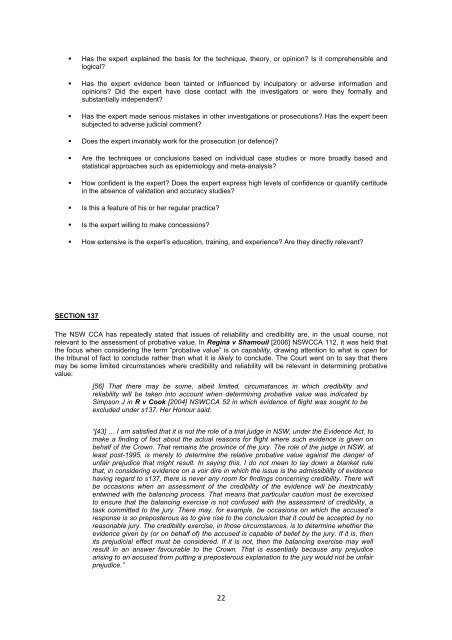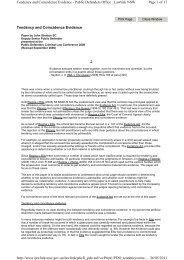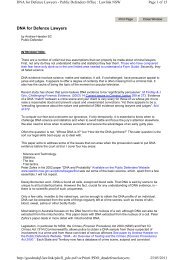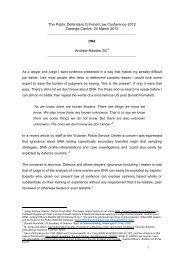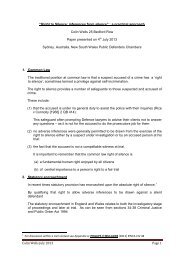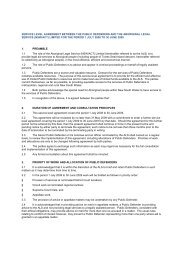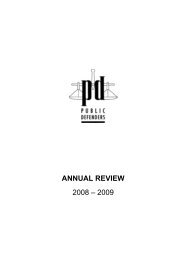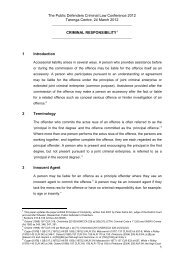Expert Evidence, by Dina Yehia SC - The Public Defenders
Expert Evidence, by Dina Yehia SC - The Public Defenders
Expert Evidence, by Dina Yehia SC - The Public Defenders
You also want an ePaper? Increase the reach of your titles
YUMPU automatically turns print PDFs into web optimized ePapers that Google loves.
• Has the expert explained the basis for the technique, theory, or opinion? Is it comprehensible and<br />
logical?<br />
• Has the expert evidence been tainted or influenced <strong>by</strong> inculpatory or adverse information and<br />
opinions? Did the expert have close contact with the investigators or were they formally and<br />
substantially independent?<br />
• Has the expert made serious mistakes in other investigations or prosecutions? Has the expert been<br />
subjected to adverse judicial comment?<br />
• Does the expert invariably work for the prosecution (or defence)?<br />
• Are the techniques or conclusions based on individual case studies or more broadly based and<br />
statistical approaches such as epidemiology and meta-analysis?<br />
• How confident is the expert? Does the expert express high levels of confidence or quantify certitude<br />
in the absence of validation and accuracy studies?<br />
• Is this a feature of his or her regular practice?<br />
• Is the expert willing to make concessions?<br />
• How extensive is the expert’s education, training, and experience? Are they directly relevant?<br />
SECTION 137<br />
<strong>The</strong> NSW CCA has repeatedly stated that issues of reliability and credibility are, in the usual course, not<br />
relevant to the assessment of probative value. In Regina v Shamouil [2006] NSWCCA 112, it was held that<br />
the focus when considering the term “probative value” is on capability, drawing attention to what is open for<br />
the tribunal of fact to conclude rather than what it is likely to conclude. <strong>The</strong> Court went on to say that there<br />
may be some limited circumstances where credibility and reliability will be relevant in determining probative<br />
value:<br />
[56] That there may be some, albeit limited, circumstances in which credibility and<br />
reliability will be taken into account when determining probative value was indicated <strong>by</strong><br />
Simpson J in R v Cook [2004] NSWCCA 52 in which evidence of flight was sought to be<br />
excluded under s137. Her Honour said:<br />
“[43] … I am satisfied that it is not the role of a trial judge in NSW, under the <strong>Evidence</strong> Act, to<br />
make a finding of fact about the actual reasons for flight where such evidence is given on<br />
behalf of the Crown. That remains the province of the jury. <strong>The</strong> role of the judge in NSW, at<br />
least post-1995, is merely to determine the relative probative value against the danger of<br />
unfair prejudice that might result. In saying this, I do not mean to lay down a blanket rule<br />
that, in considering evidence on a voir dire in which the issue is the admissibility of evidence<br />
having regard to s137, there is never any room for findings concerning credibility. <strong>The</strong>re will<br />
be occasions when an assessment of the credibility of the evidence will be inextricably<br />
entwined with the balancing process. That means that particular caution must be exercised<br />
to ensure that the balancing exercise is not confused with the assessment of credibility, a<br />
task committed to the jury. <strong>The</strong>re may, for example, be occasions on which the accused’s<br />
response is so preposterous as to give rise to the conclusion that it could be accepted <strong>by</strong> no<br />
reasonable jury. <strong>The</strong> credibility exercise, in those circumstances, is to determine whether the<br />
evidence given <strong>by</strong> (or on behalf of) the accused is capable of belief <strong>by</strong> the jury. If it is, then<br />
its prejudicial effect must be considered. If it is not, then the balancing exercise may well<br />
result in an answer favourable to the Crown. That is essentially because any prejudice<br />
arising to an accused from putting a preposterous explanation to the jury would not be unfair<br />
prejudice.”<br />
22


